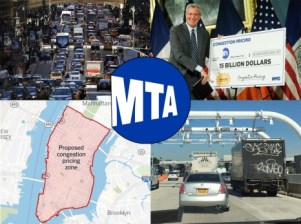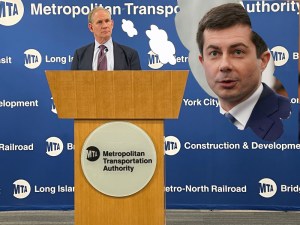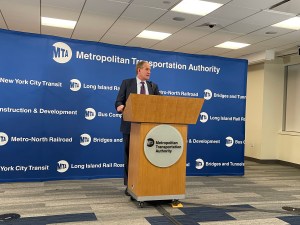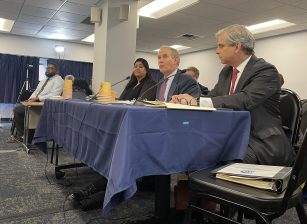OPINION: Pete Buttigieg Is Failing New York (And The Country) on Congestion Pricing
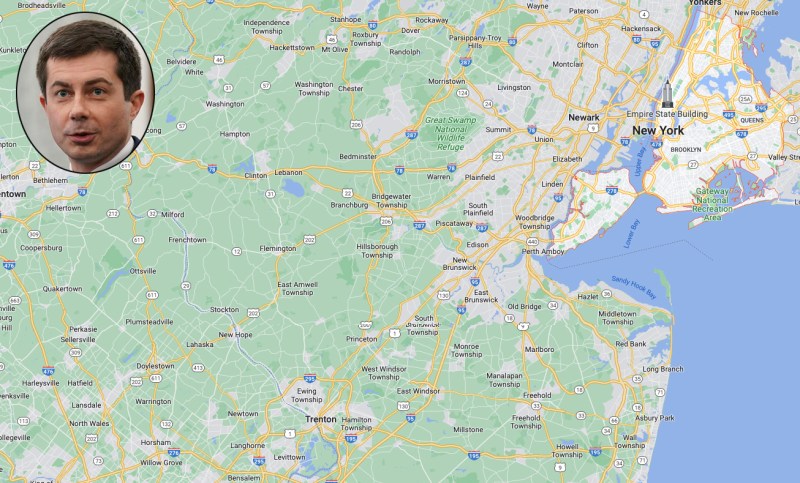
New Yorkers finally got a tiny hint about the kinds of questions the Federal Highway Administration was asking the MTA about its environmental assessment for congestion pricing. And the questions raise some serious … questions.
The federal government has asked more than 400 technical questions about the draft document, delaying its release, and on Thursday, MTA Chairman and CEO Janno Lieber finally pulled back the curtain a bit.
“The models of air quality and traffic that we have to build are so complex,” said Lieber. “We’re talking about a 28-county region, we have to model the impacts on traffic all the way down to close to the suburbs of Philadelphia. That’s the way that the federal environmental review requires. So when they ask us to change elements or variables that are in the model, that model takes five days to run.”
Traffic in Philadelphia?
So this is what Transportation Secretary Pete Buttigieg believes holds the key to a program that will reduce traffic, reduce pollution and fund $15 billion in capital plan funding that will resignal the subways, install elevators, buy modern train cars and electric buses and electric bus depots?
Philadelphia?
When Buttigieg took the reins at the U.S. Department of Transportation, we were told (including by him!) that, finally, people who got it were about to breathe new life into the hidebound Agency of No. Buttigieg talked a big game about fixing the sins of past planning decisions and bringing Vision Zero to the national stage — and then, crucially, hired Polly Trottenberg as his number two.
Hey Janno: If U really want #congestionpricing like U say, you'll send us advocates @SecretaryPete's 430 questions, like @ReinventAlbany asked in its April 26 FOIL, so we can amplify you in calling out their stupidity. @kduggan16 @ClaytonGuse @ndhapple @GershKuntzman @DaveCoIon
— Charles Komanoff (@Komanoff) June 9, 2022
The move boosted a former MTA Board member and former head of a pro-biking, pro-transit New York City DOT to the top of the federal food chain. Together, we were told (including by them!) that the U.S. DOT now included people who understood what congestion pricing meant for the city, not just in terms of its ability to get people out of cars, but as the linchpin of a capital plan that was supposed to finally fix years of neglect to New York’s mass transit system.
This far into the game though, there aren’t 400 questions that Buttigieg and Trottenberg need to ask about congestion pricing, there’s only one that all New Yorkers have: Where are you?
This interminable 16-month schedule was dropped in New York’s lap to study the very simple effect of adding a toll to previously untolled crossings into New York City. No one in the city or state government is asking to strip mine the Cloisters or do large-scale dynamite fishing in the East River — the kinds of things for which the environmental review process was designed. But if this study needs to take 16 months, Buttigieg (and Trottenberg) should be doing everything in their power to ensure that this process only takes 16 months to do, especially given that the Democrats won’t likely hold a Congressional majority come January. But someone as ambitious as Pete Buttigieg, who as a reminder is the Secretary of Transportation of the United States of America, could ensure that schedule doesn’t slip. If he wanted to, of course.
I'm pretty sure it will happen. Which is why @GovKathyHochul needs to talk to @SecretaryPete ASAP and expedite #CongestionPricing NOW.
When GOP takes over the executive, they're just gonna block it again. https://t.co/MIirxmQta8
— Pedro (@_pjrt) June 9, 2022
“There’s a way in which the bureaucracy moves when they want to, or they feel pressured by the Cabinet secretary,” said one MTA insider. “What are you doing as a Cabinet secretary who wants to run for president if it’s not something? So the most generous interpretation here is that congestion pricing is not his ‘something.'”
While Buttigieg searches for his Big Something, congestion pricing flags and flails, subject to defensive world-salad from its alleged champions and fearmongering from cynical opponents scrounging for votes without a positive vision for their own backyards. By some miracle, New Yorkers have stood by the traffic toll, showing that they’re ready for a new way idea to manage the snarled traffic in and around Manhattan. But every delay is just another opportunity for pro-traffic media to vaguely gesture towards unnamed “business leaders” who “have concerns” about a policy they actually pushed for. And every one of those propaganda pieces is another moment to perhaps push New York’s own attempt at congestion pricing descends into the Valley of Death, the moment when support for the program wanes as people only think about it in the abstract as a toll with no benefit.
Buttigieg seemed happy to have his name in headlines and statements of thanks as the man responsible for breaking the blockade that was simply, “What kind of environmental review does the MTA need to do here?” The one time he showed up in New York since then, he ran from reporters asking if the federal government would ensure the program happens.
Recently, the closest Buttigieg has come to New York City has been a tour of New Jersey with (wait for it!) top congestion pricing opponent Rep. Josh Gottheimer of New Jersey.
The fate of congestion pricing in New York City could very well determine the fate of the program is cities across the country and, as such, the fate of President Biden’s ambitious climate goals.
Will Buttigieg happy to see his name in headlines that inform people why congestion pricing died before it even started?
Dave Colon covers transit for Streetsblog.
